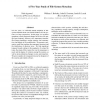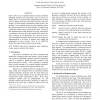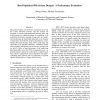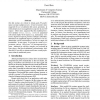113
Voted
SIGOPS
2010
15 years 1 months ago
2010
The file system is one of the most critical components of the operating system. Almost all applications running in the operating system require file systems to be available for ...
130
Voted
MASCOTS
2003
15 years 4 months ago
2003
This paper is motivated by a simple question: what are the energy consumption characteristics of mobile storage alternatives? To answer this question, we are faced with a design s...
104
Voted
FAST
2003
15 years 4 months ago
2003
We propose and evaluate the concept of a semantically-smart disk system (SDS). As opposed to a traditional “smart” disk, an SDS has detailed knowledge of how the file system ...
120
Voted
FAST
2007
15 years 4 months ago
2007
For five years, we collected annual snapshots of filesystem metadata from over 60,000 Windows PC file systems in a large corporation. In this paper, we use these snapshots to s...
114
Voted
SIGMETRICS
1991
ACM
15 years 6 months ago
1991
ACM
Prior to this work, all implementations of stack simulation [MGS70] required more than linear time to process an address trace. In particular these implementations are often slow ...
136
Voted
ICDE
1991
IEEE
15 years 6 months ago
1991
IEEE
This paper presents a performance comparison of several file system allocation policies. The file systems are designed to provide high bandwidth between disks and main memory by...
119
Voted
HPDC
1995
IEEE
15 years 6 months ago
1995
IEEE
New file systems are critical to obtain good I/O performance on large multiprocessors. Several researchers have suggested the use of collective file-system operations, in which ...
123
Voted
MM
1999
ACM
15 years 7 months ago
1999
ACM
Integration—supporting multiple application classes with heterogeneous requirements—is an emerging trend in networks, file systems, and operating systems. In this paper, we e...
96
Voted
DATE
2010
IEEE
15 years 7 months ago
2010
IEEE
—Parallel file systems are very sensitive to adverse conditions, and the lack of synergy between such file systems and some of the applications running on them has a negative i...
118
Voted
PVM
2005
Springer
15 years 8 months ago
2005
Springer
We present an algorithm for implementing byte-range locks using MPI passive-target one-sided communication. This algorithm is useful in any scenario in which multiple processes of ...




